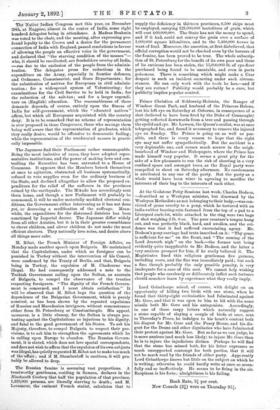The - Native Indian Congress met this year, on December 281b,'at
Nagpore, almost in the centre of India, some eight hundred delegates being in attendance. A Madras Brahmin was voted to the chair, and the meeting, after expressing pro- found loyalty to the Crown and a desire for the permanent connection of India with England, passed resolutions in favour of allowing the people an effective voice in the government, and declared that " the starving condition of the masses "- who, it should be recollected, are freeholders owning all India, —was due to the exclusion of the people from the adminis- tration. The delegates press for reductions in the expenditure on the Army, especially in frontier defences, and Ordnance, Commissariat, and Store Departments ; for the substitution of natives for Europeans in civil adminis- tration ; for a widespread system of Volunteering ; for 'examinations for the Civil Service to be held in India ; for the redaction of the salt-tax; and for a larger expendi- ture on (English) education. The reasonableness of these demands depends, of course, entirely upon the fitness of India for self-government, which the " educated natives " affirm, but which all Europeans acquainted with the country &IV. It is to be remarked that no scheme of representation is over proposed in these Congresses, those who manage them being well aware that the representation of graduates, which they really desire, would be offensive to democratic feeling ; while the representation of the uneducated masses is practi- cally impossible.














































 Previous page
Previous page